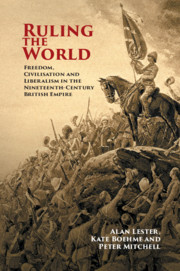Part I - 1838: The Year of Freedom
Published online by Cambridge University Press: 17 December 2020
Summary

- Type
- Chapter
- Information
- Ruling the WorldFreedom, Civilisation and Liberalism in the Nineteenth-Century British Empire, pp. 33 - 186Publisher: Cambridge University PressPrint publication year: 2021

